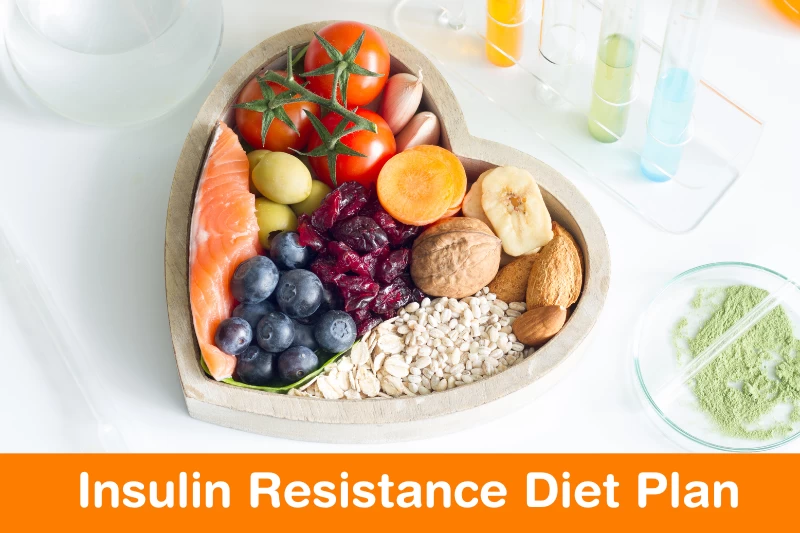


We are pleased to welcome you to our extensive blog on insulin resistance, which features the expert commentary of Dr. Pankaj Kumar, a well-respected dietician based in Delhi. In this piece, we'll delve into what insulin resistance is, how it affects health, and the solutions that Dr. Pankaj Kumar suggests. You've found the right place if you're on the lookout for efficient methods to deal with insulin resistance, improve your diet, and increase your general health.
Cells become insulin-resistant in insulin resistance. Thus, glucose uptake is impaired, raising blood sugar. Resistance causes the pancreas to produce more insulin, which can lead to high blood sugar and insulin levels. Insulin resistance can cause type 2 diabetes and other health issues.
Lifestyle and genetics can cause insulin resistance. Diabetes or insulin resistance in the family increases risk. Insulin resistance is caused by sedentary lifestyle, obesity, especially abdominal fat, and poor diets high in refined carbohydrates and sugar. PCOS, hormonal imbalances, and chronic inflammation can also cause it. Avoiding insulin resistance requires managing these risk factors.
Some people have no insulin resistance symptoms. However, common symptoms include persistent fatigue, increased hunger and cravings, especially for sugary foods, frequent urination, especially at night, and difficulty losing weight despite a healthy diet and regular exercise. Acanthosis nigricans, or dark patches, may also be present. A doctor must diagnose and treat insulin resistance.
Medical history, physical exam, and lab tests usually diagnose insulin resistance. Insulin resistance is measured by fasting blood glucose, insulin, and a glucose tolerance test. Early insulin resistance detection allows for lifestyle changes to prevent or manage related conditions like type 2 diabetes and cardiovascular disease. Early detection and management of insulin resistance require proactive screening and regular doctor visits.
Type 2 diabetes is closely linked to insulin resistance. Insulin resistance impairs blood sugar regulation. This raises blood glucose, causing type 2 diabetes. Preventing or delaying type 2 diabetes requires lifestyle changes like eating a healthy diet and exercising regularly. Early intervention and management can greatly reduce the risk of this chronic condition.
Diabetes affects cardiovascular health. Heart disease, including coronary artery disease, high blood pressure, and abnormal cholesterol, is linked to it. Insulin resistance causes inflammation, oxidative stress, and atherosclerosis by narrowing blood vessels. Lifestyle changes and medical care can reduce cardiovascular complications and improve heart health by managing insulin resistance.
??Insulin resistance hinders weight loss. Insulin resistance can cause fat storage and weight gain. Insulin resistance causes sugar and calorie cravings, making it harder to eat healthy. Insulin resistance slows fat burning and energy expenditure. Addressing insulin resistance through lifestyle changes like a balanced diet and regular exercise is essential for weight management.
In polycystic ovary syndrome (PCOS), insulin resistance causes hormonal imbalances. Insulin resistance raises insulin and androgen levels, disrupting the body's delicate hormonal balance. This can cause irregular menstrual cycles, acne, hair growth, and infertility. Lifestyle changes and targeted interventions can reduce PCOS symptoms and improve reproductive health by addressing insulin resistance. PCOS and insulin resistance must be managed by endocrinologists and gynaecologists.
Inflammation and ageing are linked to insulin resistance. Insulin resistance increases with age because insulin sensitivity decreases. Systemic inflammation can cause age-related diseases like cardiovascular and neurodegenerative disorders. Lifestyle changes like a healthy diet and regular exercise may reduce chronic inflammation and ageing by managing insulin resistance.
Insulin resistance management depends on diet and nutrition. Food choices can regulate blood sugar, improve insulin sensitivity, and reduce complications. A balanced diet with fibre, lean proteins, healthy fats, and low-glycemic index carbohydrates is advised. For stable blood sugar and metabolic health, limit refined sugars and processed foods and focus on whole, nutrient-dense foods. A registered dietician or nutritionist can help you create an insulin resistance-friendly diet.
Foods and nutrients can improve insulin sensitivity, helping manage insulin resistance. Fiber-rich whole grains, legumes, and vegetables regulate blood sugar and improve insulin sensitivity. Anti-inflammatory omega-3 fatty acids in fish, flaxseeds, and chia seeds can improve insulin sensitivity. Berry, leafy green, and nut consumption reduces oxidative stress and supports insulin sensitivity. Optimising insulin function requires a balanced diet with these essential nutrients.
3.3 Meal Planning and Portion Control
Insulin resistance management involves meal planning and portion control. Meal planning helps you control food choices and get a balanced diet. It prevents impulsive eating of high-carb foods. By preventing overeating and managing calories, portion control stabilizes blood sugar. Balanced macronutrients and proper serving sizes of carbohydrates, proteins, and fats improve insulin sensitivity and metabolic health.
Exercise reduces insulin resistance. Exercise improves insulin sensitivity and blood sugar regulation. Brisk walking, cycling, and strength training are beneficial. Exercise boosts insulin sensitivity by reducing inflammation, weight loss, and cardiovascular health. Weekly aerobic and strength training can help manage insulin resistance.
Managing insulin resistance requires stress management and sleep hygiene. Stress raises cortisol, which lowers insulin sensitivity. Meditation, yoga, and deep breathing reduce stress and improve insulin function. A regular sleep schedule and good sleep hygiene, such as a relaxing bedtime routine and enough sleep, support hormonal balance and insulin sensitivity. Stress management and quality sleep are essential to insulin resistance management.
The Mediterranean Diet has many health benefits, including insulin sensitivity. It emphasizes minimally processed foods like fruits, vegetables, whole grains, legumes, nuts, and olive oil. The diet limits red meat and processed foods and encourages lean proteins like fish and poultry. Nutrient-dense, anti-inflammatory foods make the Mediterranean Diet a good choice for insulin resistance management and overall health.
The Low Glycemic Index (GI) Diet manages insulin resistance by emphasising low-GI foods. Whole grains, legumes, non-starchy vegetables, and certain fruits are low-glycemic carbs. Low-GI foods regulate blood sugar and improve insulin sensitivity. The Low GI Diet helps insulin-resistant people control their blood sugar and lose weight.
For insulin resistance and heart health, the DASH (Dietary Approaches to Stop Hypertension) Diet is popular. It emphasizes fruits, vegetables, whole grains, lean proteins, low-fat dairy, and limiting sodium, saturated fats, and added sugars. The DASH Diet improves insulin sensitivity and blood pressure by emphasising nutrient-rich foods and reducing sodium. Insulin-resistant people can improve their health and reduce cardiovascular risk by following the DASH Diet.
The Ketogenic Diet is used to lose weight and treat insulin resistance. Ketosis occurs when carbohydrate intake is severely restricted. This diet may lower blood sugar and insulin. Discuss the Ketogenic Diet's long-term effects and suitability for insulin resistance with a doctor.
Quality sleep reduces insulin resistance. Poor sleep can disrupt hormonal balance and cause insulin resistance. Sleep deprivation raises blood sugar and decreases insulin sensitivity. Good sleep hygiene, a consistent sleep schedule, and enough sleep can improve insulin function and metabolic health.
Insulin resistance requires stress management. Mindfulness meditation, deep breathing, and yoga can reduce stress and relax. Regular exercise, hobbies, and family time are also stress-busters. In addition, a therapist or counsellor can help manage stress and improve overall well-being in insulin resistance.
Exercise helps manage insulin resistance. Regular exercise improves insulin sensitivity and blood sugar regulation. Weight loss, inflammation reduction, and cardiovascular health improve insulin function. Regular exercise—aerobic, strength, or a mix of both—is essential for managing insulin resistance and metabolic health.
Smoking cessation and alcohol restriction help manage insulin resistance and improve health. Smoking causes insulin resistance and type 2 diabetes. Quitting smoking improves insulin sensitivity and reduces complications. Alcohol can impair insulin function and cause insulin resistance. Limiting or avoiding alcohol improves metabolic control and reduces insulin-related conditions.
Delhi-based dietician Dr. Pankaj Kumar specializes in insulin resistance management. Dr. Kumar, a nutrition and dietetics specialist, helps patients improve their health with personalized meal plans. Lifestyle changes, diet optimisation, and regular monitoring improve insulin sensitivity and metabolic health in his holistic practise. Insulin resistance patients trust Dr. Pankaj Kumar's patient care and evidence-based strategies.
Dr. Pankaj Kumar customizes diets and consultations. He creates insulin resistance-specific meal plans after assessing medical history and dietary preferences. Dr. Kumar advises on diet, portion control, and meal timing to improve insulin sensitivity and health. His consultations help patients manage insulin resistance with sustainable lifestyle changes.
Dr Pankaj Kumar's practise is full of patient success stories. Patients have praised his personalized approach, expert guidance, and positive health effects. Many report better blood sugar control, weight loss, energy, and quality of life. These testimonials and success stories demonstrate Dr. Kumar's dedication to helping people overcome insulin resistance.
In sum, millions of people around the world are affected by the serious health issue that is insulin resistance. However, this condition can be controlled and even reversed with the help of information and advice from experts like Dr. Pankaj Kumar. You can improve your insulin sensitivity and health by adopting a healthy lifestyle, picking nutritious foods, and consulting a medical expert. Keep in mind that even baby steps can lead to big changes, so get to work right away!